北师大版英语八年级下册 Unit 4 Lesson 10 Problem Page 课件(31张PPT)
文档属性
| 名称 | 北师大版英语八年级下册 Unit 4 Lesson 10 Problem Page 课件(31张PPT) |
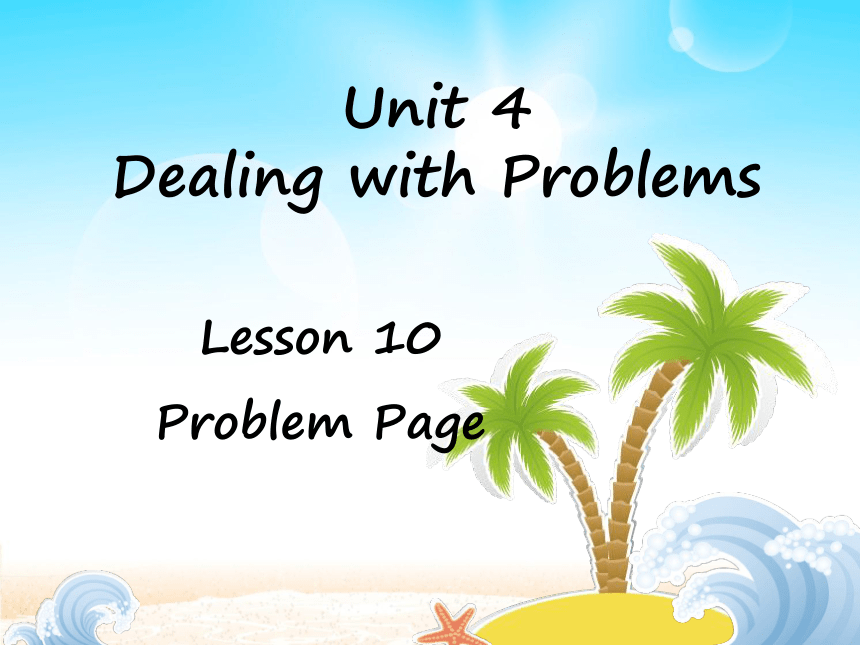
|
|
| 格式 | ppt | ||
| 文件大小 | 1.7MB | ||
| 资源类型 | 教案 | ||
| 版本资源 | 北师大版 | ||
| 科目 | 英语 | ||
| 更新时间 | 2022-06-15 17:52:15 | ||
图片预览

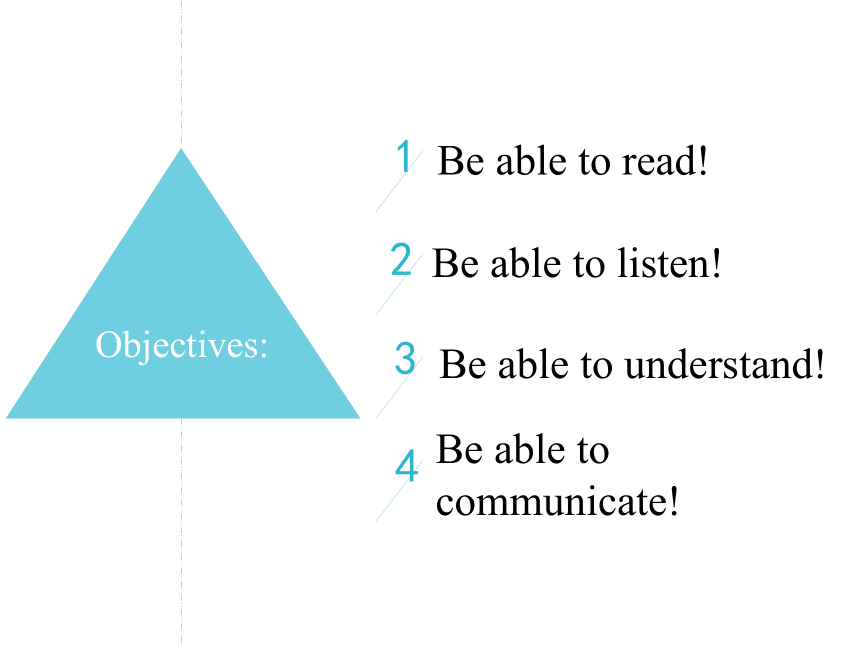
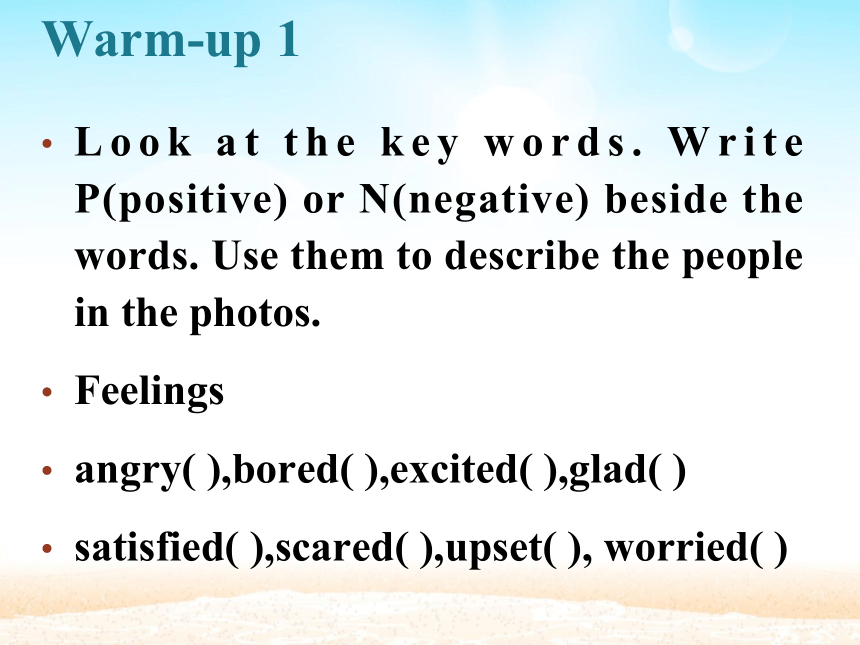
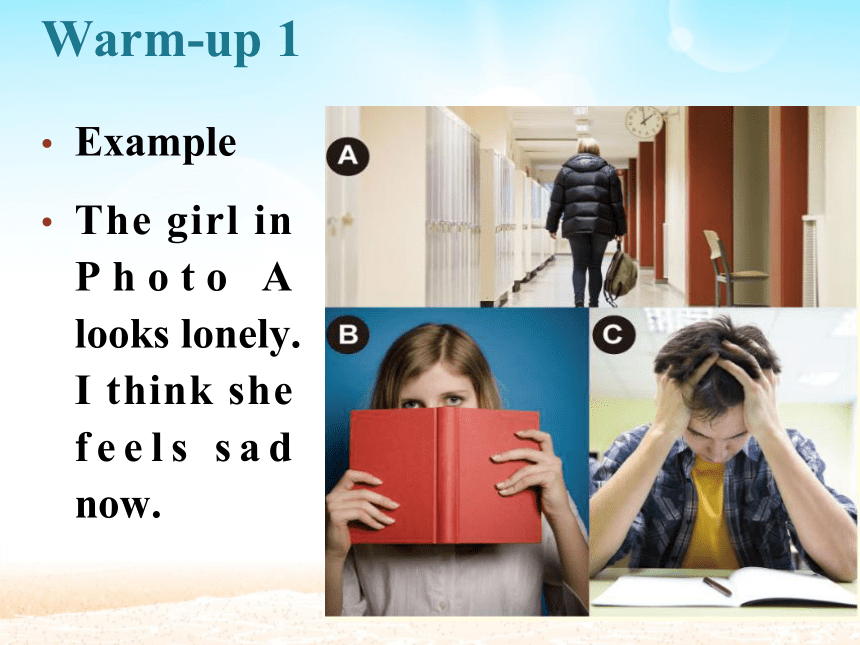
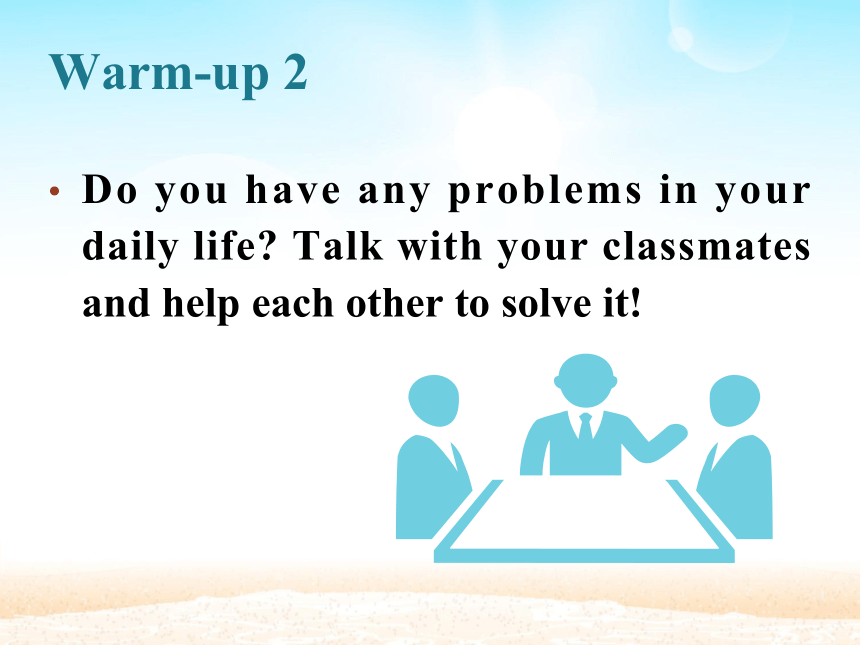
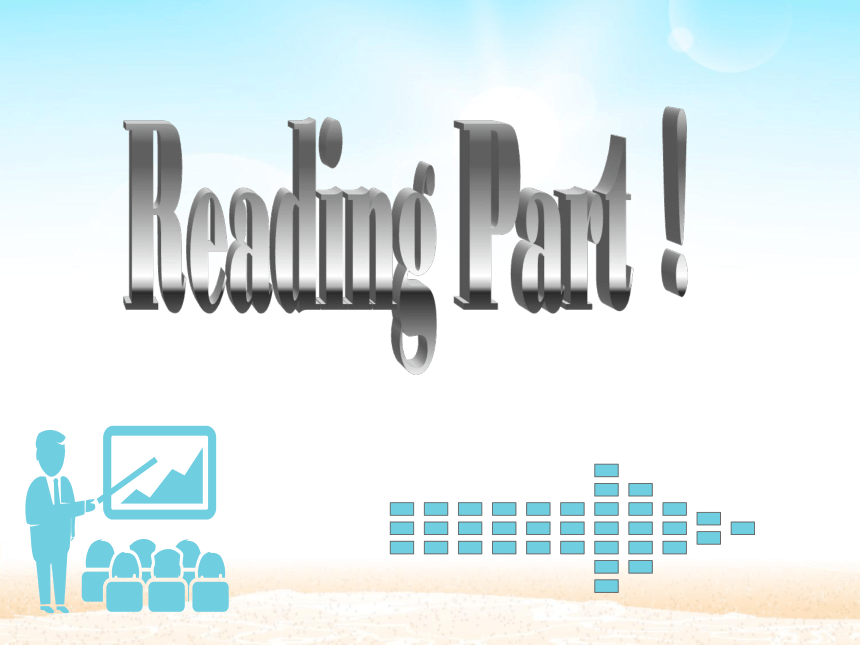
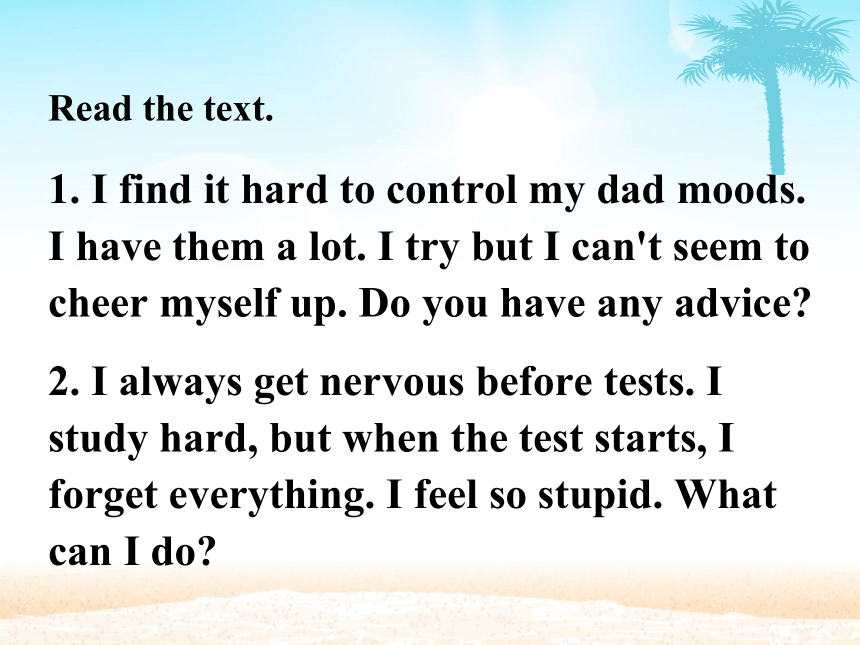
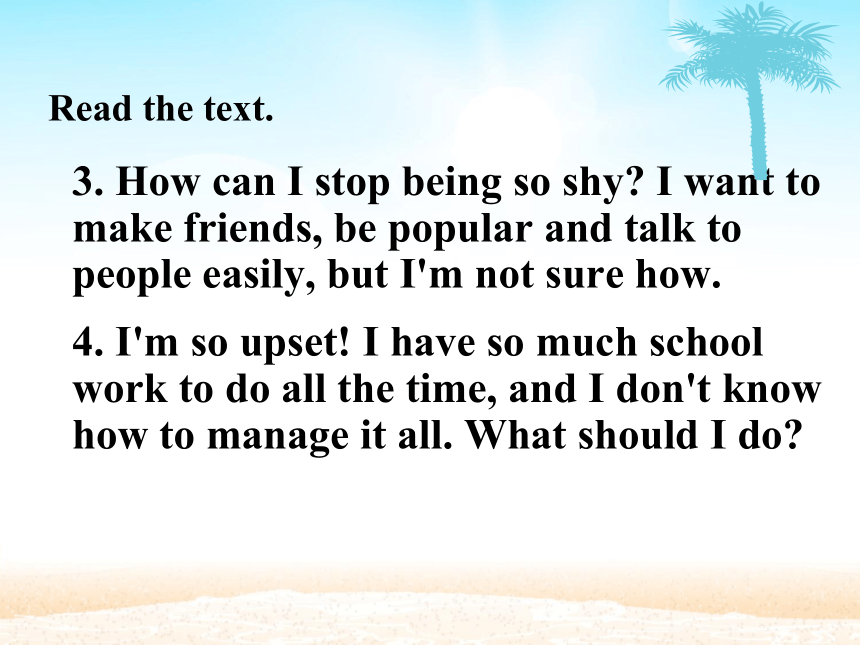



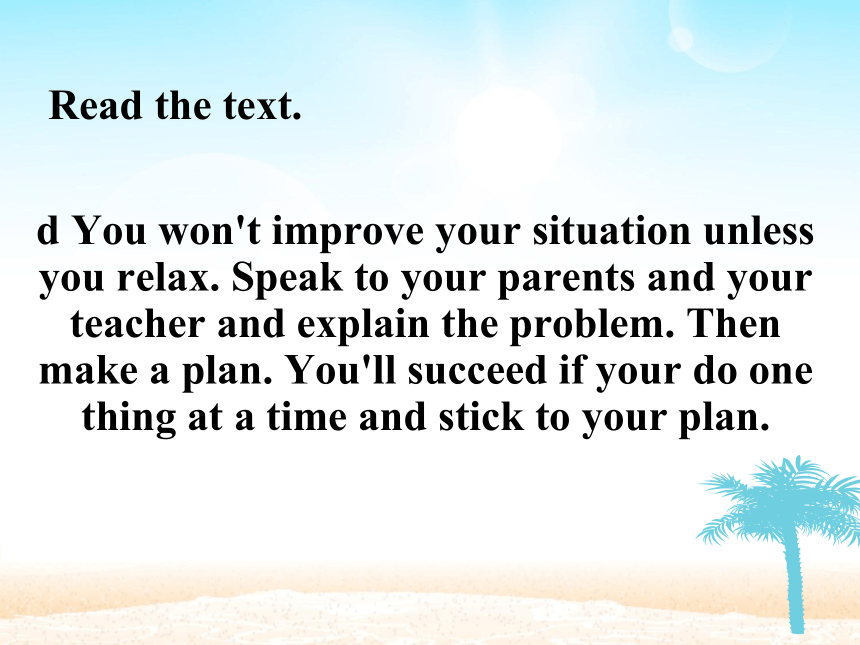
文档简介
(共31张PPT)
Lesson 10
Problem Page
Unit 4
Dealing with Problems
Objectives:
Be able to read!
1
Be able to listen!
2
Be able to communicate!
3
Be able to understand!
4
Warm-up 1
Look at the key words. Write P(positive) or N(negative) beside the words. Use them to describe the people in the photos.
Feelings
angry( ),bored( ),excited( ),glad( )
satisfied( ),scared( ),upset( ), worried( )
Warm-up 1
Example
The girl in Photo A looks lonely. I think she feels sad now.
Warm-up 2
Do you have any problems in your daily life Talk with your classmates and help each other to solve it!
Read the text.
1. I find it hard to control my dad moods. I have them a lot. I try but I can't seem to cheer myself up. Do you have any advice
2. I always get nervous before tests. I study hard, but when the test starts, I forget everything. I feel so stupid. What can I do
Read the text.
3. How can I stop being so shy I want to make friends, be popular and talk to people easily, but I'm not sure how.
4. I'm so upset! I have so much school work to do all the time, and I don't know how to manage it all. What should I do
Read the text!
a Most people are shy from time to time, so you're not alone. If you meet new people, ask them about their interests and their everyday life. It's a great way to break the ice and turn strangers into friends. Start making friendly conversations today. You won't develop your social skills until you try.
Read the text.
b Trust yourself. If you study hard everyday, you'll achieve your goals. When you're taking your exam, pay attention to your answers and don't think about your grades. If you worry too much, it won't help you produce good results.
Read the text.
c It's common to be in low spirits sometimes, but it's unhealthy to often have bad moods. You feel yourself getting angry, take ten deep breaths. It'll help you cool down. If you're feeling upset, try talking about your problems with somebody you trust.
Read the text.
d You won't improve your situation unless you relax. Speak to your parents and your teacher and explain the problem. Then make a plan. You'll succeed if your do one thing at a time and stick to your plan.
Listen to the tape, and check your answer from above. Then read aloud the text!
Check our answers in pairs and talk with each other.
Grammar Part!
条件状语从句
状语是句子的重要修饰成分。状语是谓语里的另一个附加成分,它附加在谓语中心语的前面,从情况,时间,处所,方式,条件,对象,肯定,否定,范围和程度等方面对谓语中心进行修饰或限制。用来说明地点、时间、原因、目的、结果、条件、方向、程度、方式和伴随状况等。
条件状语从句
状语一般由副词、介词短语、分词和分词短语、不定式或相当于副词的词或短语来担当。其位置一般放在句末,但也可放在句首或句中。
副词是一种用来修饰动词,形容词,副词或全句的词,说明时间,地点,程度,方式等概念。
条件状语从句
1.副词一般在句子中做状语
He speaks English very well. 他英语说得非常好.中的very是程度副词,用来修饰well。very well是修饰speak的程度状语。
He is playing under the tree.
他在树下玩儿.中的under the tree是地点状语.
条件状语从句
2. 不定式在句子中可以作目的状语
I come specially to see you.我专门来看你.
3.介词短语
Ten years ago, She began to live in
Dalian.
The boy was praised for his bravery.
条件状语从句
4.从句作状语
When she was 12 years old, she began
to live in Dalian.
If I am not busy tomorrow, I will play
football with you.
5.分词作状语
Having had a quarrel with his wife, he
left home in a bad temper。
在复合句中,由从句表示的状语叫做条件状语从句。它可以用来修饰主语中的动词.形容词.副词等。根据它表达的意思,状语从句可以分为时间状语从句,原因状语从句,条件状语从句,比较状语从句,目的状语从句,结果状语从句和让步状语从句等
条件状语从句
由连接词if或unless引导的状语从句叫做条件状语从句。(注意:在含有条件状语从句的复合句中,如果主句是一般将来时态,从句要用一般现在是[主将从先原则])在英文中,条件是指某一件事情实现之后(状语从句中的动作),其它事情(主句中的动作)才能发生,通常译作“假如,如果,除非”。
条件状语从句
条件状语从句的位置
可放在句首或句尾,放在句首时常用逗号与主句隔开。
①常用引导词:
if , unless
②特殊引导词:
as long as(除非;只要),supposing(假设),on condition that(条件是),in case(如果)
条件状语从句
If 引导词用法
if 引导的条件句有:真实条件句和非真实条件句两种:
1.真实条件句:表示在某种条件下某事很可能发生。
If you ask him, he will help you.
如果你请他帮忙,他会帮你的。
条件状语从句
If you fail in the exam, you will let him down.
如果你考试不及格,你会让他失望的。
If it rains tomorrow, we won’t go on a picnic.
如果明天下雨,我们就不去野餐。
注意:在含有条件状语从句的复合句中,表示将来时态,主句是一般将来时态,从句要用一般现在时[主将从现原则],并且,切记紧跟着if的那句话是从句。)
条件状语从句
2. 非真实条件句是虚拟语气的一种,表示与事实相反 ,不可实现的条件或根本不可能存在的条件,也就是一种虚拟的条件或假设,从句多用一般过去时或过去完成时。
如: If I were you, I would invite him to the party.
如果我是你,我会邀请他参加聚会。
条件状语从句
unless引导词用法
固定搭配: unless = if...not 除非,若不,除非在……的时候
You will fail to arrive there in time unless you start earlier.
If you don’t start earlier, you will fail to arrive there in time.
如果你不早点动身,你就不能及时赶到那儿。
条件状语从句
Unless it rains, the game will be played.
If it doesn't rain,the game will be played.
除非下雨,比赛将照常进行。
Let's go out for a walk unless you are too tired.
If it doesn't rain tomorrow ,we will go to the zoo.
条件状语从句就是用以表示“在某种条件下,会……”
条件状语从句
Practice the sentences above with your partners!
与你的同伴练习以上句型!
请课后认真复习本单元语法内容,并朗诵课文对话!
Lesson 10
Problem Page
Unit 4
Dealing with Problems
Objectives:
Be able to read!
1
Be able to listen!
2
Be able to communicate!
3
Be able to understand!
4
Warm-up 1
Look at the key words. Write P(positive) or N(negative) beside the words. Use them to describe the people in the photos.
Feelings
angry( ),bored( ),excited( ),glad( )
satisfied( ),scared( ),upset( ), worried( )
Warm-up 1
Example
The girl in Photo A looks lonely. I think she feels sad now.
Warm-up 2
Do you have any problems in your daily life Talk with your classmates and help each other to solve it!
Read the text.
1. I find it hard to control my dad moods. I have them a lot. I try but I can't seem to cheer myself up. Do you have any advice
2. I always get nervous before tests. I study hard, but when the test starts, I forget everything. I feel so stupid. What can I do
Read the text.
3. How can I stop being so shy I want to make friends, be popular and talk to people easily, but I'm not sure how.
4. I'm so upset! I have so much school work to do all the time, and I don't know how to manage it all. What should I do
Read the text!
a Most people are shy from time to time, so you're not alone. If you meet new people, ask them about their interests and their everyday life. It's a great way to break the ice and turn strangers into friends. Start making friendly conversations today. You won't develop your social skills until you try.
Read the text.
b Trust yourself. If you study hard everyday, you'll achieve your goals. When you're taking your exam, pay attention to your answers and don't think about your grades. If you worry too much, it won't help you produce good results.
Read the text.
c It's common to be in low spirits sometimes, but it's unhealthy to often have bad moods. You feel yourself getting angry, take ten deep breaths. It'll help you cool down. If you're feeling upset, try talking about your problems with somebody you trust.
Read the text.
d You won't improve your situation unless you relax. Speak to your parents and your teacher and explain the problem. Then make a plan. You'll succeed if your do one thing at a time and stick to your plan.
Listen to the tape, and check your answer from above. Then read aloud the text!
Check our answers in pairs and talk with each other.
Grammar Part!
条件状语从句
状语是句子的重要修饰成分。状语是谓语里的另一个附加成分,它附加在谓语中心语的前面,从情况,时间,处所,方式,条件,对象,肯定,否定,范围和程度等方面对谓语中心进行修饰或限制。用来说明地点、时间、原因、目的、结果、条件、方向、程度、方式和伴随状况等。
条件状语从句
状语一般由副词、介词短语、分词和分词短语、不定式或相当于副词的词或短语来担当。其位置一般放在句末,但也可放在句首或句中。
副词是一种用来修饰动词,形容词,副词或全句的词,说明时间,地点,程度,方式等概念。
条件状语从句
1.副词一般在句子中做状语
He speaks English very well. 他英语说得非常好.中的very是程度副词,用来修饰well。very well是修饰speak的程度状语。
He is playing under the tree.
他在树下玩儿.中的under the tree是地点状语.
条件状语从句
2. 不定式在句子中可以作目的状语
I come specially to see you.我专门来看你.
3.介词短语
Ten years ago, She began to live in
Dalian.
The boy was praised for his bravery.
条件状语从句
4.从句作状语
When she was 12 years old, she began
to live in Dalian.
If I am not busy tomorrow, I will play
football with you.
5.分词作状语
Having had a quarrel with his wife, he
left home in a bad temper。
在复合句中,由从句表示的状语叫做条件状语从句。它可以用来修饰主语中的动词.形容词.副词等。根据它表达的意思,状语从句可以分为时间状语从句,原因状语从句,条件状语从句,比较状语从句,目的状语从句,结果状语从句和让步状语从句等
条件状语从句
由连接词if或unless引导的状语从句叫做条件状语从句。(注意:在含有条件状语从句的复合句中,如果主句是一般将来时态,从句要用一般现在是[主将从先原则])在英文中,条件是指某一件事情实现之后(状语从句中的动作),其它事情(主句中的动作)才能发生,通常译作“假如,如果,除非”。
条件状语从句
条件状语从句的位置
可放在句首或句尾,放在句首时常用逗号与主句隔开。
①常用引导词:
if , unless
②特殊引导词:
as long as(除非;只要),supposing(假设),on condition that(条件是),in case(如果)
条件状语从句
If 引导词用法
if 引导的条件句有:真实条件句和非真实条件句两种:
1.真实条件句:表示在某种条件下某事很可能发生。
If you ask him, he will help you.
如果你请他帮忙,他会帮你的。
条件状语从句
If you fail in the exam, you will let him down.
如果你考试不及格,你会让他失望的。
If it rains tomorrow, we won’t go on a picnic.
如果明天下雨,我们就不去野餐。
注意:在含有条件状语从句的复合句中,表示将来时态,主句是一般将来时态,从句要用一般现在时[主将从现原则],并且,切记紧跟着if的那句话是从句。)
条件状语从句
2. 非真实条件句是虚拟语气的一种,表示与事实相反 ,不可实现的条件或根本不可能存在的条件,也就是一种虚拟的条件或假设,从句多用一般过去时或过去完成时。
如: If I were you, I would invite him to the party.
如果我是你,我会邀请他参加聚会。
条件状语从句
unless引导词用法
固定搭配: unless = if...not 除非,若不,除非在……的时候
You will fail to arrive there in time unless you start earlier.
If you don’t start earlier, you will fail to arrive there in time.
如果你不早点动身,你就不能及时赶到那儿。
条件状语从句
Unless it rains, the game will be played.
If it doesn't rain,the game will be played.
除非下雨,比赛将照常进行。
Let's go out for a walk unless you are too tired.
If it doesn't rain tomorrow ,we will go to the zoo.
条件状语从句就是用以表示“在某种条件下,会……”
条件状语从句
Practice the sentences above with your partners!
与你的同伴练习以上句型!
请课后认真复习本单元语法内容,并朗诵课文对话!
同课章节目录
- Unit 1 Technology and the Future
- Lesson 1 Schools of the Future
- Lesson 2 Online Life
- Lesson 3 Tomorrow's Jobs
- Communication Workshop
- Unit 2 Communication
- Lesson 4 Animal Talk
- Lesson 5 Meeting People
- Lesson 6 The Texting Generation
- Communication Workshop
- Unit 3 Festivals and Holidays
- Lesson 7 Chinese New Year
- Lesson 8 A Picnic
- Lesson 9 Thanksgiving
- Communication Workshop
- Unit 4 Dealing with Problems
- Lesson 10 Problem Page
- Lesson 11 Online Time
- Lesson 12 Generation Gap
- Communication Workshop
- Unit 5 Memories
- Lesson 13 A Daughter's Letter
- Lesson 14 Grandpa's Memories
- Lesson 15 Life in the 1950s
- Communication Workshop
- Unit 6 Detectives
- Lesson 16 A Detective Story (I)
- Lesson 17 A Detective Story (II)
- Lesson 18 The Mystery Writer
- Communication Workshop
